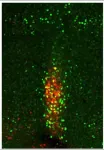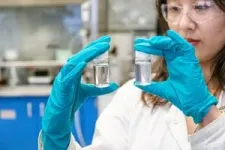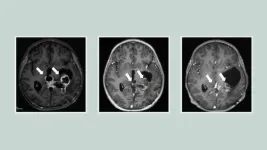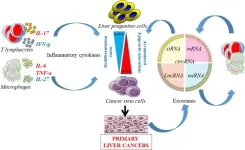(Press-News.org) LA JOLLA, CA—Neuroscientists at Scripps Research have identified brain circuits that make mammals want to eat more when they are exposed to cold temperatures.
Mammals automatically burn more energy to maintain normal body temperature when exposed to cold. This cold-activated increase in energy expenditure triggers an increase in appetite and feeding, although the specific mechanism controlling this had been unknown. In the new study, reported on August 16, 2023, in Nature, the researchers identified a cluster of neurons that work as a “switch” for this cold-related, food-seeking behavior in mice. The discovery could lead to potential therapeutics for metabolic health and weight loss.
“This is a fundamental adaptive mechanism in mammals and targeting it with future treatments might allow the enhancement of the metabolic benefits of cold or other forms of fat burning,” says study senior author Li Ye, PhD, associate professor and the Abide-Vividion Chair in Chemistry and Chemical Biology at Scripps Research.
The study’s first author was Ye Lab postdoctoral research associate Neeraj Lal, PhD.
Because exposure to cold leads to enhanced energy burning to stay warm, cold water immersion and other forms of “cold therapy” have been explored as methods for losing weight and improving metabolic health. One drawback of cold therapies is that humans’ evolved responses to cold are not designed to cause weight loss (an effect that could have been fatal during the frequent periods of food scarcity in pre-modern times). Cold, like dieting and exercise, increases appetite to counteract any weight-loss effect. In the study, Ye and his team set out to identify the brain circuitry that mediates this cold-induced appetite increase.
One of their first observations was that, with the onset of cold temperatures (from 73F to 39F), mice increase their food seeking only after a delay of about six hours, suggesting this behavioral change is not simply a direct result of cold sensing.
Using techniques called whole-brain clearing and light sheet microscopy, the researchers compared the activity of neurons across the brain during cold versus warm conditions. Soon they made a key observation: While most of the neuronal activity across the brain was much lower in the cold condition, portions of a region called the thalamus showed higher activation.
Eventually, the team zeroed in on a specific cluster of neurons called the xiphoid nucleus of the midline thalamus, showing that activity in these neurons spiked under cold conditions just before the mice stirred from their cold-induced torpor to look for food. When less food was available at the onset of the cold condition, the activity increase in the xiphoid nucleus was even greater—suggesting that these neurons respond to a cold-induced energy deficit rather than cold itself.
When the researchers artificially activated these neurons, the mice increased their food-seeking, but not other activities. Similarly, when the team inhibited the activity of these neurons, the mice decreased their food-seeking. These effects appeared only under the cold condition, implying that cold temperatures provide a separate signal that must also be present for appetite changes to occur.
In a last set of experiments, the team showed that these xiphoid nucleus neurons project to a brain region called the nucleus accumbens—an area long known for its role in integrating reward and aversion signals to guide behavior, including feeding behavior.
Ultimately, these results may have clinical relevance, Ye says, for they suggest the possibility of blocking the usual cold-induced appetite increase, allowing relatively simple cold exposure regimens to drive weight loss much more efficiently.
“One of our key goals now is to figure out how to decouple the appetite increase from the energy-expenditure increase,” he says. “We also want to find out if this cold-induced appetite-increase mechanism is part of a broader mechanism the body uses to compensate for extra energy expenditure, for example after exercise.”
“Xiphoid nucleus of the midline thalamus controls cold-induced food seeking” was co-authored by Neeraj Lal, Samarth Aggarwal, Alan Zhang, Kristina Wang, Tianbo Qi, Zhengyuan Pang, Dong Yang, Victoria Nudell, and Li Ye, all of Scripps Research; Phuong Le and Gene Yeo of the University of California—San Diego; and Alexander Banks of Beth Israel Deaconess Medical Center.
Funding was provided by the National Institutes of Health (DP2DK128800, DK114165, DK124731, DK134609, MH132570), the Dana Foundation, the Whitehall Foundation, the Baxter Foundation and the Abide-Vividion Endowment.
About Scripps Research
Scripps Research is an independent, nonprofit biomedical institute ranked one of the most influential in the world for its impact on innovation by Nature Index. We are advancing human health through profound discoveries that address pressing medical concerns around the globe. Our drug discovery and development division, Calibr, works hand-in-hand with scientists across disciplines to bring new medicines to patients as quickly and efficiently as possible, while teams at Scripps Research Translational Institute harness genomics, digital medicine and cutting-edge informatics to understand individual health and render more effective healthcare. Scripps Research also trains the next generation of leading scientists at our Skaggs Graduate School, consistently named among the top 10 US programs for chemistry and biological sciences. Learn more at www.scripps.edu.
END
How cold temperatures trigger the brain to boost appetite
Scripps Research scientists’ discovery could lead to new weight loss and metabolic health treatments
2023-08-16
ELSE PRESS RELEASES FROM THIS DATE:
Microplastic pollution: Plants could be the answer
2023-08-16
Could plants be the answer to the looming threat of microplastic pollution? Scientists at UBC’s BioProducts Institute found that if you add tannins—natural plant compounds that make your mouth pucker if you bite into an unripe fruit—to a layer of wood dust, you can create a filter that traps virtually all microplastic particles present in water.
While the experiment remains a lab set-up at this stage, the team is convinced that the solution can be scaled up easily and inexpensively once they find the right industry partner.
Microplastics ...
Directly involved war veterans exhibit nearly twice the PTSD symptoms years after 2014 Israel-Gaza conflict, affecting parents' well-being
2023-08-16
Hebrew University researchers, Shahaf Leshem, Eldad Keha, and Prof. Eyal Kalanthroff, have unveiled significant findings regarding the lasting psychological impacts stemming from the 2014 Israel-Gaza military conflict. The study sheds light on the deep repercussions of trauma for both war veterans and their parents. Notably, veterans directly involved in the conflict exhibited nearly twice the level of PTSD symptoms compared to indirectly active veterans, a difference persisting even five years after the conflict. Remarkably, ...
Study finds improved survival for incurable brain tumor, providing ‘a crack in the armor’
2023-08-16
Michigan — For the first time, researchers have found a potential drug candidate that improved outcomes for patients with a type of childhood brain tumor for which there are no effective treatments. The compound, called ONC201, nearly doubled survival for patients with diffuse midline glioma (DMG) or diffuse intrinsic pontine glioma (DIPG), compared to previous patients.
The findings are reported by an international team of researcher led by the University of Michigan Health Rogel Cancer Center and the Chad Carr Pediatric Brain Tumor Center.
In addition to reporting on the results of two early stage clinical ...
Pig kidney xenotransplantation performing optimally after 32 days in human body
2023-08-16
NEW YORK, NY, AUGUST 16, 2023 — Surgeons at NYU Langone Health have transplanted a genetically engineered pig kidney that continues to function well after 32 days in a man declared dead by neurologic criteria and maintained with a beating heart on ventilator support. This represents the longest period that a gene-edited pig kidney has functioned in a human, and the latest step toward the advent of an alternate, sustainable supply of organs for transplant.
Multimedia Materials Available
Multimedia materials, including photos and a B-roll package, are available for download.
About the Procedure
The procedure, performed on July 14, 2023, and led by Robert Montgomery, ...
ASBMB names 2024 award winners
2023-08-16
The American Society for Biochemistry and Molecular Biology announced today the winners of its annual awards. Colleagues and other leaders in the field nominated the winners for making significant contributions to biochemistry and molecular biology and the training of emerging scientists.
The recipients will give talks about their work at the society’s 2024 annual meeting, Discover BMB, slated for March 23–26 in San Antonio.
In addition to cash prizes ranging from $2,000 to $35,000, each ASBMB award consists of a plaque and transportation ...
New and updated resources published to help guide oncology care in the Middle East and North Africa (MENA)
2023-08-16
PLYMOUTH MEETING, PA [August 16, 2023] — The National Comprehensive Cancer Network® (NCCN®)—an alliance of leading cancer centers—today announced that a library of resources for improving cancer care in the Middle East and North Africa (MENA) has been updated and expanded in collaboration with regional experts. The United States-based non-profit has worked with the King Abdulaziz Medical City in Riyadh, Saudi Arabia, since 2015 to standardize cancer treatment based on the latest evidence and expert-consensus, as part of the MENA-NCCN Regional Coordinating Center. Their efforts have led to the ...
Gray wolf recovery is a success—is that a problem?
2023-08-16
Over the past 30 years, efforts to recover gray wolf populations in the United States have been broadly successful, with many regions now sporting robust populations of the charismatic carnivore. Writing in BioScience, wolf experts David E. Ausband and L. David Mech describe the conservation landscape and also the obstacles that wolves face as their populations expand into their historical ranges.
"Remarkable wolf conservation success yields remarkable challenges," ...
Common wristbands ‘hotbed’ for harmful bacteria including E. coli, staphylococcus
2023-08-16
The COVID-19 pandemic took disinfecting to new heights. Now, a new study examining a commonly used item might convince you not to let your guard down just yet.
Researchers from Florida Atlantic University’s Charles E. Schmidt College of Science tested wristbands of various textures to determine their risk for harboring potentially harmful pathogenic bacteria. Despite being worn daily, routine cleaning of wristbands is generally overlooked or simply ignored.
For the study, researchers tested plastic, rubber, cloth, leather ...
What is the next step in preventative therapies for treating liver cancer?
2023-08-16
Primary liver cancers ranked as the sixth most commonly diagnosed cancers and the third leading cause of cancer-related death in 2020. Among all primary liver cancers, HCC is the most common cancer, accounting for more than 80% of cases with a 5-year survival rate of less than 10% in Western countries. Despite significant progress in diagnosis and treatments, HCC, often diagnosed at late stages, remains a life-threatening disease with an increasing incidence. Therefore, a better understanding of the underlying mechanisms triggering the early steps of tumorigenesis represents a great interest to predict and propose more effective therapeutic ...
Layered and traditional semiconductors heterogenous integration open door for post Moore era
2023-08-16
Scientists in NEXT Lab, Tsinghua University have revealed the fabrication and engineering techniques of TMDs and provided a comparative view between TMDs and traditional semiconductors, demonstrating the benefit of combining TMDs with traditional semiconductors.
The research, published in IJEM, shows how to fabricate layered semiconductors modulated with various methods, including phase engineering, defect engineering, doping, and alloying. Then the authors discuss various possibilities to combine layered semiconductors with traditional semiconductors.
Transition metal dichalcogenides (TMDs) with suitable ...
LAST 30 PRESS RELEASES:
COVID-19 vaccination during pregnancy may help prevent preeclampsia
Menopausal hormone therapy not linked to increased risk of death
Chronic shortage of family doctors in England, reveals BMJ analysis
Booster jabs reduce the risks of COVID-19 deaths, study finds
Screening increases survival rate for stage IV breast cancer by 60%
ACC announces inaugural fellow for the Thad and Gerry Waites Rural Cardiovascular Research Fellowship
University of Oklahoma researchers develop durable hybrid materials for faster radiation detection
Medicaid disenrollment spikes at age 19, study finds
Turning agricultural waste into advanced materials: Review highlights how torrefaction could power a sustainable carbon future
New study warns emerging pollutants in livestock and aquaculture waste may threaten ecosystems and public health
Integrated rice–aquatic farming systems may hold the key to smarter nitrogen use and lower agricultural emissions
Hope for global banana farming in genetic discovery
Mirror image pheromones help beetles swipe right
Prenatal lead exposure related to worse cognitive function in adults
Research alert: Understanding substance use across the full spectrum of sexual identity
Pekingese, Shih Tzu and Staffordshire Bull Terrier among twelve dog breeds at risk of serious breathing condition
Selected dog breeds with most breathing trouble identified in new study
Interplay of class and gender may influence social judgments differently between cultures
Pollen counts can be predicted by machine learning models using meteorological data with more than 80% accuracy even a week ahead, for both grass and birch tree pollen, which could be key in effective
Rewriting our understanding of early hominin dispersal to Eurasia
Rising simultaneous wildfire risk compromises international firefighting efforts
Honey bee "dance floors" can be accurately located with a new method, mapping where in the hive forager bees perform waggle dances to signal the location of pollen and nectar for their nestmates
Exercise and nutritional drinks can reduce the need for care in dementia
Michelson Medical Research Foundation awards $750,000 to rising immunology leaders
SfN announces Early Career Policy Ambassadors Class of 2026
Spiritual practices strongly associated with reduced risk for hazardous alcohol and drug use
Novel vaccine protects against C. diff disease and recurrence
An “electrical” circadian clock balances growth between shoots and roots
Largest study of rare skin cancer in Mexican patients shows its more complex than previously thought
Colonists dredged away Sydney’s natural oyster reefs. Now science knows how best to restore them.
[Press-News.org] How cold temperatures trigger the brain to boost appetiteScripps Research scientists’ discovery could lead to new weight loss and metabolic health treatments







